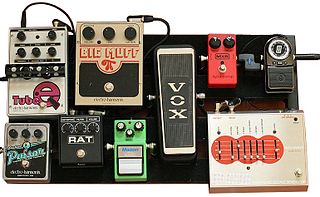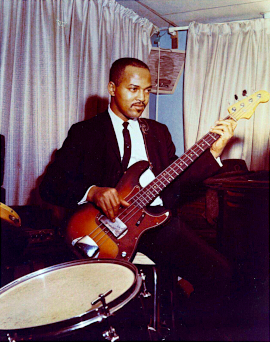
An effects unit, effects processor, or effects pedal is an electronic device that alters the sound of a musical instrument or other audio source through audio signal processing.

John Francis "Jaco" Pastorius III was an American jazz bassist, composer, and producer. Widely regarded as one of the greatest and most influential bassists of all time, Pastorius recorded albums as a solo artist, band leader, and as a member of the jazz fusion group Weather Report from 1976 to 1981. He also collaborated with numerous artists, including Pat Metheny and Joni Mitchell.

Slapping and popping are ways to produce percussive sounds on a stringed instrument. They are primarily used on the double bass or bass guitar. Slapping on bass guitar involves using the edge of one's knuckle, where it is particularly bony, to quickly strike the string against the fretboard. On bass guitars, this is commonly done with the thumb, while on double bass, the edge of the hand or index finger may be used. Popping refers to pulling the string away from the fretboard and quickly releasing it so it snaps back against the fretboard. On bass guitar, the two techniques are commonly used together in alternation, though either may be used separately.

Patrick Bruce Metheny is an American jazz guitarist and composer.

Sean Landon Reinert was an American musician. He was the drummer for the rock band Æon Spoke and the drummer and cofounder of the progressive metal band Cynic along with Paul Masvidal until leaving the band in September 2015.

What Is This was an American rock band that originated in Fairfax High School in Los Angeles, California. Formed by guitarist Hillel Slovak, drummer Jack Irons, vocalist Alain Johannes, and bassist Todd Strassman, the band served as the nucleus for the Red Hot Chili Peppers. Members of the band would go on to perform with Eleven, Chris Cornell, Pearl Jam, Mark Lanegan, Them Crooked Vultures, Alain Johannes Trio and Queens of the Stone Age.

James Lee Jamerson was an American bass player. He was the uncredited bassist on most of the Motown Records hits in the 1960s and early 1970s, and is now regarded as one of the greatest and most influential bass players in modern music history. He was inducted into the Rock and Roll Hall of Fame in 2000. As a session musician he played on twenty-three Billboard Hot 100 number-one hits, as well as fifty-six R&B number-one hits.

"Confusion" is the sixth single released by British group New Order in August 1983 with the catalogue number FAC 93. It was the follow-up to their breakthrough hit "Blue Monday" and is unique for having both Peter Hook and Bernard Sumner playing bass guitars on it. The song is produced by influential New York DJ Arthur Baker. As a result, it was recorded in New York, a rarity for the band. Three remixes served as B-sides on the initial 12" release: "Confused Beats", "Confusion Instrumental" and "Confusion Rough Mix". The two tracks on side A are mixed together, which when played in sequence, act as a thirteen and half minute long remix by Arthur Baker. The "Rough Mix" on side B is the original song mixed by New Order.
Carol Kaye is an American musician. She is one of the most prolific recorded bass guitarists in rock and pop music, playing on an estimated 10,000 recordings in a career spanning over 65 years.

Sean Malone was an American musician who played primarily fretless bass guitar and Chapman Stick. He was most famous for his work with progressive metal band Cynic, in which he developed a strong partnership with the drummer Sean Reinert. Malone and Reinert played on several records together outside Cynic, making them one of the most favorable modern progressive rhythm sections. Malone also did a number of session jobs for various bands and musicians.
"Sister Ray" is a song by the Velvet Underground that closes side two of their 1968 album White Light/White Heat. The lyrics are by Lou Reed, with music composed by John Cale, Sterling Morrison, Maureen Tucker and Reed.

Paul Albert Masvidal is an American musician, best known as the guitarist, singer and a founding member of the progressive metal band Cynic. He has remained a continual member in Cynic for nearly three decades and has developed numerous other projects including Æon Spoke, Onward with Love, and Masvidal. Masvidal was ranked in Loudwire's 66 Best Hard Rock + Metal Guitarists of All Time and 50 Best Metal Songwriters of All Time.
"Tangerine" is a folk rock song by the English band Led Zeppelin. Recorded in 1970, it is included on the second, more acoustic-oriented side of Led Zeppelin III (1970). The plaintive ballad reflects on lost love and features strummed acoustic guitar rhythm with pedal steel guitar.

Michael Earl Henderson was an American bass guitarist and vocalist. He was known for his work with Miles Davis in the early 1970s on early fusion albums such as Jack Johnson, Live-Evil, and Agharta, along with a series of his own R&B/soul hits and others featuring him on vocals, particularly the Norman Connors-produced hit "You Are My Starship" in 1976 and other songs in the mid to late-1970s.

The Echoplex is a tape delay effects unit, first made in 1959. Designed by engineer Mike Battle, the Echoplex set a standard for the effect in the 1960s; according to Michael Dregni, it is still regarded as "the standard by which everything else is measured." Used by some of the most notable electric guitar players of the 1960s and 1970s, original Echoplexes are highly sought after.
"European Son", also known as "European Son ", is a song written and performed by the American experimental rock band The Velvet Underground. It appears as the final track on their 1967 debut album The Velvet Underground & Nico. It is also the album's longest track at more than seven and a half minutes.

Cynic is an American progressive metal band formed in Miami, Florida by Paul Masvidal in 1987. Masvidal originally served solely as the band's guitarist, but later took over as lead vocalist and chief songwriter. Cynic incorporates elements of progressive rock, alternative, and metal.

Æon Spoke is an alternative rock band from Los Angeles. It was created by members of Cynic and former members of Death, Paul Masvidal and Sean Reinert, when they relocated from Miami to Los Angeles.

Chet Atkins' Gallopin' Guitar is the first studio album released by American guitarist Chet Atkins on the RCA Victor label. It was available as a 10-inch vinyl record.
"Hey Baby (New Rising Sun)" or simply "Hey Baby" is a song written and recorded by American musician Jimi Hendrix, from his second posthumous album Rainbow Bridge (1971). The song is a slower and more melodic piece, which features the prominent use of chorus- and tremolo-effects on guitar. Hendrix uses an idealized feminine figure that recurs in several of his lyrics. Commentators have seen the song as representative of his post-Band of Gypsys musical direction.















